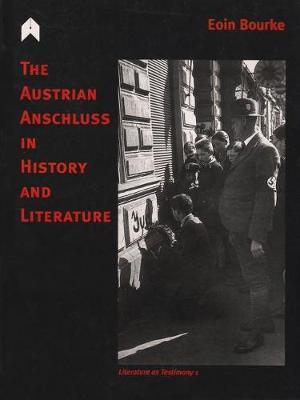The Austrian Anschluss in History and Literature

The Austrian Anschluss in History and Literature
Following his thesis that history-writing and literature are mutually complementary, Eoin Bourke illuminates literary texts for audiences which might be unfamiliar with the historical background against which they were conceived, he attempts to "deepen the retelling" of history, and make it more immediate to the modern-day reader by use of personal anecdotes, excerpts from works of literature and journalistic articles.
Bourke begins with a succinct but informative description of the political circumstances which obtained during the 1930s in Austria, and proceeds to draw on the abundance of contemporary texts in order to depict the nazification of Austria in all its dimensions: the sights and sounds of the scenes of jubilation which greeted the arrival of the German invader, the sense of nightmare and foreboding experienced by Jews and others who had reason to fear Hitler's armies, the expressions of blatant anti-Semitism by the administration and the citizenry, the humiliation of Jews in the streets of Vienna, their gradual exclusion from society, the Holocaust, and the attempts at resistance. Linking the passages he has selected, Bourke provides an instructive, absorbing and well researched commentary on the events: he describes the systematic and brutal elimination of the opponents of the regime, lists a catalogue of cruelty inflicted on the Jews of Vienna, and highlights the bureaucratic difficulties encountered by would-be emigrants. However, he allows the works themselves to speak more eloquently in conveying the private thoughts, sensation. and pain of the individual. The personal anecdotes and remembrances imbue the bare facts--and sometimes even horrific facts can become mere statistics--with an immediacy which conveys to the modern-day reader the keen sense of tragedy, loss and ever-present anxiety of those who live through the events.PRP: 185.69 Lei
Acesta este Pretul Recomandat de Producator. Pretul de vanzare al produsului este afisat mai jos.
167.12Lei
167.12Lei
185.69 LeiLivrare in 2-4 saptamani
Descrierea produsului
Following his thesis that history-writing and literature are mutually complementary, Eoin Bourke illuminates literary texts for audiences which might be unfamiliar with the historical background against which they were conceived, he attempts to "deepen the retelling" of history, and make it more immediate to the modern-day reader by use of personal anecdotes, excerpts from works of literature and journalistic articles.
Bourke begins with a succinct but informative description of the political circumstances which obtained during the 1930s in Austria, and proceeds to draw on the abundance of contemporary texts in order to depict the nazification of Austria in all its dimensions: the sights and sounds of the scenes of jubilation which greeted the arrival of the German invader, the sense of nightmare and foreboding experienced by Jews and others who had reason to fear Hitler's armies, the expressions of blatant anti-Semitism by the administration and the citizenry, the humiliation of Jews in the streets of Vienna, their gradual exclusion from society, the Holocaust, and the attempts at resistance. Linking the passages he has selected, Bourke provides an instructive, absorbing and well researched commentary on the events: he describes the systematic and brutal elimination of the opponents of the regime, lists a catalogue of cruelty inflicted on the Jews of Vienna, and highlights the bureaucratic difficulties encountered by would-be emigrants. However, he allows the works themselves to speak more eloquently in conveying the private thoughts, sensation. and pain of the individual. The personal anecdotes and remembrances imbue the bare facts--and sometimes even horrific facts can become mere statistics--with an immediacy which conveys to the modern-day reader the keen sense of tragedy, loss and ever-present anxiety of those who live through the events.Detaliile produsului








